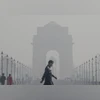The enforcement of Stage IV of GRAP, which bans BS-3 and BS-4 diesel vehicles, has disrupted travel and transportation, particularly for those engaged in the wedding business.
The Central Pollution Control Board imposed GRAP-IV measures after Delhi's air quality index (AQI) entered the 'severe' category on Sunday.
The restrictions, which came into effect at 8 AM Monday, aim to curb pollution caused by older diesel vehicles.
However, the measure has had unintended consequences.
Travel agencies report a sharp rise in demand for BS-6 and CNG vehicles, including cars like Ertiga, Innova, and traveller buses, as they scramble to meet commitments made before the ban.
"The wedding season has added to the pressure. Many vehicles were pre-booked months in advance, and with this sudden ban, we had to scramble to adjust," said Sewak Tuar, a travel agency owner.
More From This Section
"We are struggling to arrange new vehicles, the petrol, CNG, and BS-6 compliant ones, as weddings and transportation needs are being heavily affected," he added.
Aryan Sinha, another travel agency owner, highlighted the growing challenges "We have vehicles available for nearby trips like Amritsar, but families booking vehicles for destinations such as Manali, Mussoorie, and Rishikesh, as well as for weddings, are facing difficulties," he said.
According to Sinha, wedding bookings often require 10 to 15 vehicles for multiple days. Managing this demand is challenging because they now have to ensure vehicles meet the required standards, he said.
"For large groups, CNG buses, traveller buses, and BS-6 compliant vehicles, especially newer models from 2020 onward, are in high demand," he told PTI.
The restrictions have also impacted routine tourism as pollution prompts many families to plan trips to hill stations.
Rajesh Kumar, another travel agency owner, said, "This is the peak wedding season, and many families plan destination weddings or large gatherings requiring bulk bookings. Rearranging these commitments has been costly and disruptive, as we now have to rent additional vehicles or upgrade our fleet to comply with the regulations." The shortage has also caused financial strain on agencies, with many reporting losses.
"A large portion of our fleet comprises BS-3 and BS-4 vehicles, which are now off the roads. To accommodate the demand, we've had to rent compliant vehicles, which increases costs," Kumar added.
Delhi's AQI worsened on Monday and Tuesday, crossing 450 and entering the 'severe-plus' range. While Wednesday saw slight improvement, the AQI remains in the 'severe' range.
GRAP, or Graded Response Action Plan, for Delhi-NCR is divided into four stages of air quality Stage 1 for "poor" AQI ranging between 201 and 300, Stage 2 for "very poor" AQI of 301-400, Stage 3 for "severe" AQI of 401-450 and Stage 4 for "severe plus" AQI more than 450.
With schools now closed due to pollution, many families are booking trips to hill stations. Dharamveer Singh from Kusha Travels, a travel agency based in Pushp Vihar, said three to four families are booking tour packages from Delhi every day, typically for trips lasting three to four days.
"Many families are booking trips to Manali, Mussoorie, and Shimla. Vehicles are being reserved for three to four days at a time, further adding to the shortage," Singh said.
At 9 am, the national capital recorded an AQI of 376, according to the CPCB. The weather department has predicted shallow fog during the day.
(Only the headline and picture of this report may have been reworked by the Business Standard staff; the rest of the content is auto-generated from a syndicated feed.)

)